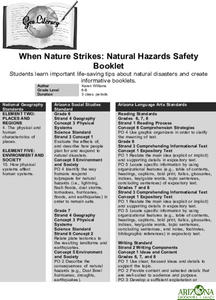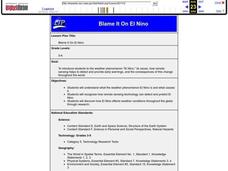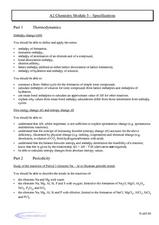Curated OER
Density and Mass
Learners experiment to find which liquids are more dense. In this density and mass lesson, students predict and then test objects to observe and measure their density. learners observe which items sink and float. Students complete...
Mr. E. Science
Stars, Galaxies and the Universe
It takes 225 million years for our sun to travel around the galaxy. The presentation covers astronomical units, light years, telescopes, types of stars, the life cycle of a star, and types of galaxies. This is the last lesson in a...
Curated OER
Organic and Biological Compounds
Carbon as a building block for organic compounds is demonstrated by diagrams and facts for its bonding style. Saturated and unstaturated hydrocarbons are detailed and facts about biological compounds such as proteins, nucleic...
Curated OER
Microwave Telescopes
Discovery of microwaves and other trivia starting this PowerPoint will help interest your class in the application and behavior of these radio waves. Great images to show real-life experiments and equipment help understanding of how the...
Curated OER
The Interactive Periodic Table of the Elements
Pupils study the different types of metals. In this investigative lesson students watch a demonstration on the effects of temperature on atoms and take a tour through baone matter.
Curated OER
Properties of Matter
In this matter learning exercise, students compare metals and non-metals, elements, and chemical and physical properties. This learning exercise has 22 short answer questions.
Curated OER
Atoms: The Building Block of Matter
High schoolers examine how scientific theories are developed. In this matter lesson plan, students explore the basic idea of quantum theory. They create a timeline of scientists, their contributions, and discoveries.
Curated OER
Moles Worksheet
In this chemistry instructional activity, students examine the energy rule of moles and answer the essay questions. The answers are include with the instructional activity.
Curated OER
Move It!
Students explore the notion that simple devices can help us move objects when an understanding of forces is applied. They apply the design process, make predictions, draw sketches, make a model and evaluate their solution.
Curated OER
Introduction to Bonding
For this chemistry worksheet, students create new and true statements while replacing false ones in order to properly define parts of the concept of bonding.
Curated OER
The Insect Files
Students are provided with a physical description of the insect, in words and graphics, including body parts, special adaptations, color, and so on. They explore and report on all four elements of an insect's habitat: food, water,...
Curated OER
Quantum Physics
Students discuss the mass-energy relationship based on Einstein's work. They calculate the energy released in various scenerios and sketch diagrams for the Lyman, Balmer and Pfund Series. In groups, they discuss the role of photons and...
Curated OER
Atomic Models
Students explain scientists' ideas about the structure of the atom over the last century. They develop a pictorial history of the changing ideas about the atom and write a caption describing the scientific thinking behind the model.
Curated OER
Acids and Bases
Students use supporting evidence to predict if common household substances are acids or bases. They determine the pH of the substances and describe the results of the investigation and characteristics of each substance.
Curated OER
Transition Metals (II)
Students discuss transition metals, their properties, and where they are located on the periodic table as well as why transition metals are ideal for coins. After discussion, they conduct an experiment using copper in the form of old...
Cornell University
Splitting Water with Electricity
Explore how electricity splits water molecules into hydrogen and oxygen. Learners begin by calculating the voltage necessary to separate the water. They then perform the experiment and measure the ratio of hydrogen and oxygen bubbles.
Curated OER
When Nature Strikes: Natural Hazards Safety
Students observe the impact of natural disasters on humans, and become aware of the dangers of environmental hazards such as flash floods, tornadoes, and hurricanes.
Curated OER
Atoms, Molecules and Ions
Atomic theory, experiments that contributed to our knowledge of matter, atomic structure, isotopes, and ions are covered in these 33 slides. Quality diagrams and labeled charts will help activate understanding. The presentation concludes...
Curated OER
Swamps, Shrimp, and Tsunamis: A Simulation of Sustainable Development Issues in Coastal Ecuador
Young scholars examine the economic benefits, environmental losses and dangers of the shrimp farming industry on the coast of Ecuador. They read a script, role-play people involved in the shrimp business, and write an essay of the pros...
Curated OER
Blame It On El Nino
Students study the weather phenomenon El Nino is and what causes it, and recognize how remote sensing technology can detect and predict El Nino. Students discover how El Nino affects weather conditions throughout the globe through research.
Chicago Botanic Garden
Carbon, Greenhouse Gases, and Climate
Climate models mathematically represent the interactions of the atmosphere, oceans, land, sun, surface, and ice. Part two in the series of four lessons looks at the role greenhouse gases play in keeping Earth warm and has participants...
Curated OER
Chemistry Module 5 - Specifications
While this resource does not provide problems for chemistry learners to solve, it outlines skills that they should have and concepts that they should grasp. Topics include thermodynamics, periodicity, redox equilibria, transition metals,...
Santa Monica College
Single and Double Displacement Reactions
If you aren't part of the solution, you are part of the precipitate! Young chemists learn about single and double displacement reactions including precipitation reactions, neutralization reactions, and gas forming reactions. They perform...
Curated OER
Amounts of Dissolved Oxygen in Various Bodies of Water
Students test water to determine the dissolved oxygen content while displaying the proper use of testing instruments while visiting water testing sites. They determine if the amount of dissolved oxygen is appropriate for the tested...























